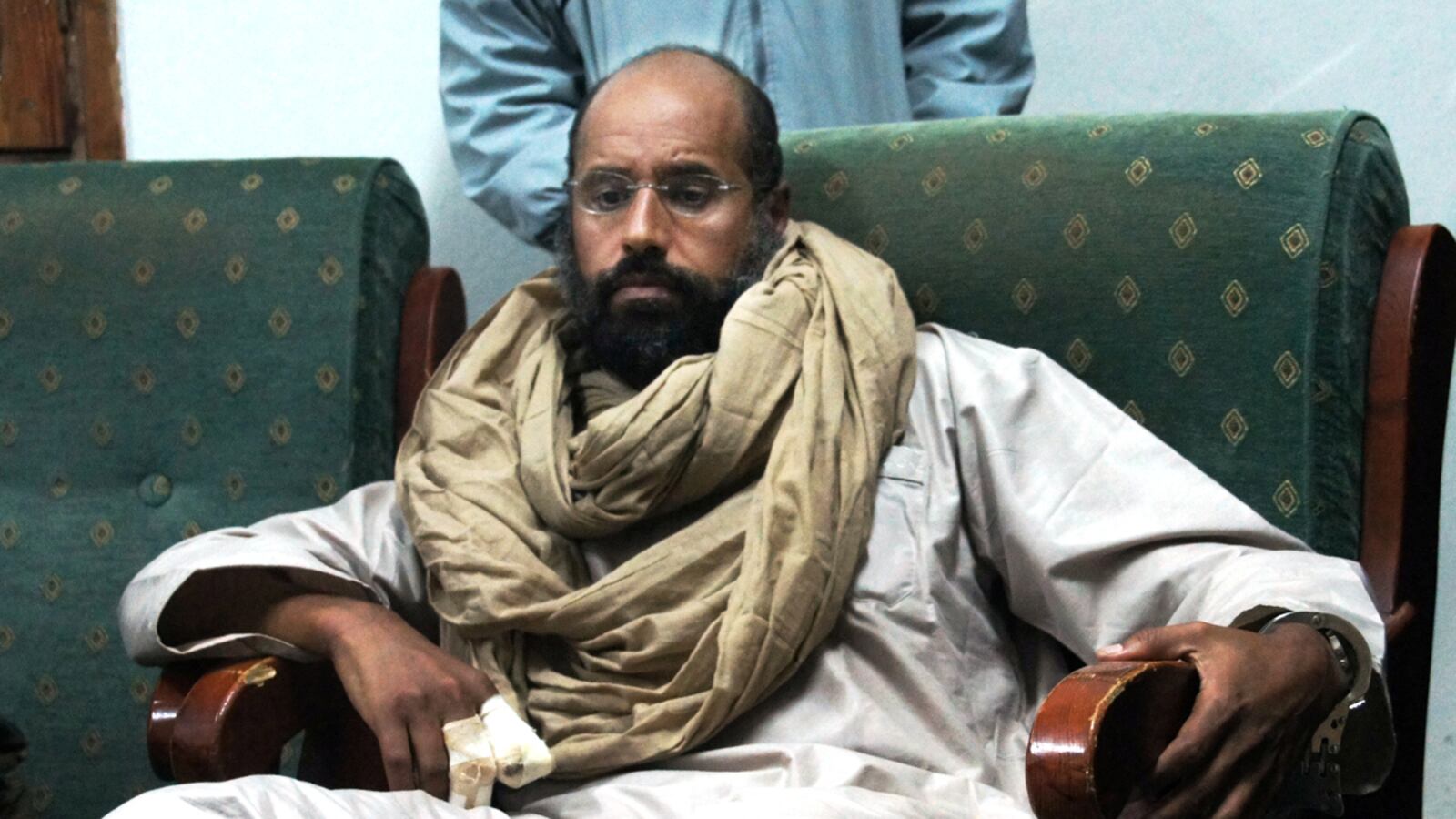After nine months of preparing a case, Libya still appears ill equipped to give Saif al-Islam, the 40-year-old son and accomplice of slain dictator Muammar Gaddafi, a fair trial. Even the longest-serving Gaddafi-era political prisoner, Ahmed Al-Zubair al-Senussi, recommends that Saif be handed over to the International Criminal Court (ICC) at The Hague.
Libya’s new authorities, though, are pressing on, and say Saif will likely stand trial next month in the hardscrabble mountain town of Zintan, where he’s been held since his capture in the Sahara last November. Snubbing the ICC, Libya’s prosecutor-general’s office insists the country can hold a fair trial of Muammar Gaddafi’s onetime heir-apparent, and it has the support of key national leaders, including Mahmoud Jibril, leader of the moderate coalition that won the majority of party seats in last month’s historic elections.
The trial is slated to take place in Zintan, two hour’s drive from the capital, instead of Tripoli itself, part of a deal with the obdurate town’s militia that captured Saif and refused to hand him over to national authorities. The fact that the trial will be in one of the strongholds of the revolution is adding to alarm, prompting further questions about the credibility of the procedure.
Senussi, who was incarcerated for 31 years, serving the first nine in solitary confinement, punishment for plotting a major coup attempt against Gaddafi, argues that human rights are being violated in the new Libya, and warns that the country’s new rulers are incapable of impartially prosecuting Saif or other high-ranking former regime officials.
A Benghazi-based member of the National Transitional Council (NTC) that handed over power last week to the newly elected National Congress and who served four years longer in prison than South Africa’s Nelson Mandela, Senussi worries that post-Gaddafi Libya is tainting itself by engaging in rough justice.
“We are not ready for fair justice,” the 79-year-old says. “At the moment it is not possible in Libya. We fought this revolution to have a country free of Gaddafi-style injustice and we fought to stop the abuse of human rights. Unfortunately, we are not matching our actions with our words.”
Debate over where Saif and other high-ranking Gaddafi officials should be tried raged even before the regime had been ousted. In June 2011 Saif, along with former Libyan military intelligence chief, Abdullah al-Senussi, who fled to Mauritania, were indicted by the ICC for war crimes for their alleged roles in trying to stamp out the uprising.

The ICC has been locked in a dispute with Libya’s new authorities ever since. Lawyers at The Hague have expressed their concern about Saif’s isolation and the obstacles placed in the way of ICC lawyers and human-rights organizations from visiting him. In June, Zintan militiamen arrested ICC defense lawyer Melinda Taylor and three colleagues, accusing them of spying and passing coded escape plans to Saif—an accusation vehemently denied by Taylor. She was released after 25 days.
Public pressure has grown in Libya for Saif and other top regime figures to stand trial. But international justice experts working in Tripoli worry that Libyan authorities haven’t worked out criteria for deciding who should stand trial to answer for what crimes during the Gaddafi-era and who shouldn’t. And they argue that the country hasn’t developed the ability to mount trials meeting international legal standards.
They fear prosecutions will turn into show trials, failing to mollify Gaddafi-era victims or their families while also falling short of persuading the families of the accused that they have been treated fairly. Badly handled trials could provoke further violence and Gaddafi loyalists, who have been blamed for recent explosions, including three car bombs in Tripoli on Sunday (Aug. 19).
“Trials could lay the seeds for future conflict and won’t help advance reconciliation,” warns Omar Bakhet, a former U.N. diplomat and adviser with the International Institute for Democracy and Electoral Assistance.
A European lawyer who’s been counseling Libya’s Justice Ministry also worries. “Neither the Libyan judges nor the prosecutors are able at this stage to mount complex cases: they have no experience of handling evidence drawn from multiple witnesses and don’t know how to build up a case involving forensic evidence nor how to analyze huge caches of documents, and on top of that they don’t know how to use trials to work up a chain of command,” placing responsibility where it should be, he says.
“What they are used to is prosecuting cases based on witness statements from one or two people and a confession, more likely coerced than volunteered,” adds the lawyer, who declined to be named for this article.
Saif alluded to this style of justice in comments he submitted in June to the ICC. “Over a year ago, representatives of the NTC asked the international community to intervene so that the Libyan people could have justice, I am asking for exactly the same thing—the only way for Libya and the Libyan people to have justice is for the ICC to try this case in a fair, impartial and independent manner, and, in so doing, set standards, which Libya can follow on its future path to democracy and the rule of law.”
He added: “There will be no truth if witnesses are faced with possible life sentences for simply testifying in my favor. I am not afraid to die but if you execute me after such a trial you should just call it murder.”
Only one senior Gaddafi official has so far seen the inside of a Libyan courtroom since the uprising. The trial of Buzeid Dorda, a former Gaddafi intelligence chief, which started on June 5, has done nothing to inspire international confidence.
Dorda hobbled into court on crutches with a broken pelvis. How he sustained the injury hasn’t been discussed during his brief court appearances in a trial that keeps being halted. According to Hanan Salah of Human Rights Watch, who interviewed Dorda, he threw himself out of a window because he feared he was going to be sexually violated by his captors.
Amnesty International has issued a series of reports documenting torture in post-Gaddafi prisons.
While international observers remain alarmed at the abuse of prisoners and concerned at the prospects of trials of former regime officials, the Dorda trial has triggered suspicions among some of the original rebel leaders in eastern Libya that prosecutions of Gaddafi loyalists will be confined to offenses committed during the insurrection only. They argue that this approach saves those in positions of authority in the new Libya from having to answer questions about their own Gaddafi-era roles.
Former U.N. diplomat Omar Bakhet says suspicions of a cover-up are likely to escalate without a transparent justice strategy. “You have to decide what crimes should be prosecuted at what seniority, and you have to match that with the judicial system’s capacity to cope with the case load. Above all you have to decide how it all fits in with the long-term goal of establishing stability leading to reconciliation.”
The charges filed against Dorda were all connected with what he did during the uprising. That seems likely to be the case with Saif as well. Libyan prosecutors say he will be charged with encouraging Gaddafi loyalists to kill demonstrators and rebels during the rebellion. He will face execution by hanging if found guilty.
Libya’s new authorities dismiss the worries, arguing that national law has supremacy over the ICC. And they insist they have solid evidence against Saif, including confessions of subordinates, and recordings of phone conversations, as well as his speeches on television during the revolution.
The initial transition leaders had wanted to bring Saif to trial before now but had been held up by his militia captors insisting he be tried in Zintan. Tripoli has now given way on that. “Saif will be tried in Libya,” Alajami Ali Al-Ateri, the military commander who captured Saif, told The Daily Beast. “And what better place than Zintan. We are determined for him to face justice here.”






